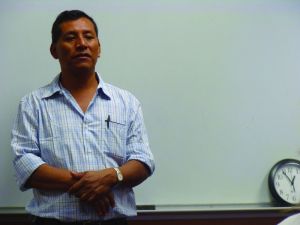 Until you meet the person behind your steaming, aromatic morning cup of Fair Trade coffee, it is nearly impossible to envision the day-to-day agenda of those coffee farmers who work tirelessly to produce a single pound of java beans. This was the case Thursday, Sept. 16, when Rigoberto Contreras Díaz, a representative from Catholic Relief Services (CRS), paid a visit to my Advanced Spanish Conversation class. As a Spanish major, former Starbucks barista and an equal rights advocate, I was very anxious to hear what Díaz had to say about his job as a coffee farmer in Santa Rosa, a city located within the state of Oaxaca, Mexico.
Until you meet the person behind your steaming, aromatic morning cup of Fair Trade coffee, it is nearly impossible to envision the day-to-day agenda of those coffee farmers who work tirelessly to produce a single pound of java beans. This was the case Thursday, Sept. 16, when Rigoberto Contreras Díaz, a representative from Catholic Relief Services (CRS), paid a visit to my Advanced Spanish Conversation class. As a Spanish major, former Starbucks barista and an equal rights advocate, I was very anxious to hear what Díaz had to say about his job as a coffee farmer in Santa Rosa, a city located within the state of Oaxaca, Mexico.
Little did I know, Díaz was about to convey a history that only Fair Trade farmers in another corner of the world could understand. My classmates and I had our questions for Díaz prepared, but his responses delved into a scope beyond what we could have ever imagined.
In many of my classes, I had learned a great deal about Fair Trade, and the benefits of equal labor on both the producer and the consumer. What I did not know is that Fair Trade also enables the families of these producers, like Díaz, to stay with their families in their own home countries.
Each year, thousands of immigrants from South America venture to make the treacherous journey across the U.S.-Mexico border but few live to tell their story. What is even worse is that more and more, it seems like less immigrants receive the respect and dignity they deserve for their hard work. Where this part leaves off, Fair Trade comes into play. Fair Trade, or “comercio justo” in Spanish, is a system in which the producer of a product—in Díaz’s case, coffee—is involved with a system that seeks to attain equality and partnership between international traders through a system of ideals.

As defined by the Fair Trade Federation, these ideals include granting “fair wages, creating opportunities for economically-deficient producers, ensuring the safety and rights of children, promoting proper environmental awareness and procedures, as well as respecting and instilling the integrity of the producer’s cultural identity.”
Many people do not realize that Fair Trade is still a growing movement and that many industries still fail in promoting and strengthening these ideals between them and their producers and consumers.
Díaz, a founding member of the Yeni Navan cooperative, has worked for 15 years in formal leadership and now works as the director of sales and marketing within the cooperative’s program. While Díaz is a fine example of what Fair Trade can help farmers attain, he still believes there are areas of Fair Trade that still need improvement.
“To cut the distance between the producer and consumer, change the process of transforming the material into a product and creating a better way of treating the crop” are all Díaz’s thoughts on what can be improved within the Fair Trade system. But he still feels that there are strengths and good intentions abound in the Fair Trade system.
“The traders have good intentions, because they know how hard everyone works to produce the coffee,” Díaz said. “Fair Trade is not lucrative but those who make the products have the right to obtain the fair price for the product.”
Díaz also pointed out the danger of big-name corporations, like Nestlé, invading provinces in Mexico where Fair Trade thrives. “You cannot compete with a company like Nestlé. They will ultimately overtake the entire province and everything will become a monopoly,” Diaz said.
It is crucial to consider, even as an economy on the rebound of a recession, what Díaz points out about the importance of Fair Trade on world relations. If America utilizes the power of Fair Trade instead of opting to purchase coffee, corn and other products at cheaper rates from places where the employees are hardly paid for their trouble and work in backbreaking conditions, it seems possible for the U.S. to become a headstrong advocate of Fair Trade.
Furthermore, it would minimize the issue of labor inequality in the U.S. and in other countries. As Americans, we give immigrants a rather unfair chance but by advocating change through Fair Trade, we can enable these strong individuals to support themselves and their families. Fair Trade gives these farmers and employees the tools to be productive—ultimately, a chance to be successful. Isn’t that what everyone deserves?
When you drink your next cup of Fair Trade coffee or tea, hopefully you find yourself saying a quiet “thank you” to those farmers, like Díaz, who work so hard to bring such a rich product to you. It is only when you are completely grateful for such small things in life, like coffee, that they truly taste so sweet.


